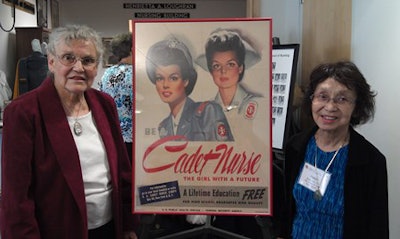 (Left) College of Nursing alumnae Thelma Robinson and Helen Nakagawa Budzynski stand next to a “Cadet Nurse” poster from the World War II period.
(Left) College of Nursing alumnae Thelma Robinson and Helen Nakagawa Budzynski stand next to a “Cadet Nurse” poster from the World War II period.Following the 1941 attack on Pearl Harbor, U.S. politicians, newspaper editorials and average citizens cried out for vengeance against Japanese-Americans, viewing them as a security risk. With little warning, Japanese-Americans living on the West Coast were rounded up and relocated to internment camps in the interior parts of the county. Among those facing relocation were “nisei,” U.S.-born children of Japanese immigrants, who were studying to become nurses. They were forced to leave their schools.
As hospitals suffered a severe nursing shortage as a result of the war, Henrietta Loughran, dean of the University of Colorado’s nursing college, considered the loss of the students’ rights and skills as unjust and a waste. So Loughran used connections from the University of Washington and the University of California San Francisco, as well as assistance from Colorado Gov. Ralph Carr, to quietly transfer students facing internment to CU to complete their bachelor’s degrees in nursing.
In September, Loughran, who died in 1980, was given the nursing college’s second annual Pathfinders award. She was recognized for “creating pathways for Japanese-American and other minority students.” Thirty-one Japanese-American alumni from 1942 to 1959 also received the award, some of them posthumously, for overcoming discrimination and adversity and “setting an example for future generations of nursing students.” At least four of the recipients were cadet nurses, whose tuition, books and uniforms were covered in return for later working in civilian and military hospitals, on reservations or other public health facilities.
Many of the students Loughran helped went onto have long, productive careers. They earned advanced degrees, did research, specialized in orthopedics, surgery and occupational health; worked for hospitals, businesses and the military; became instructors and supervisors in nursing programs; and gave the poor medical care in the states and abroad.
Loughran joined CU in 1941 as acting director on loan from the University of Washington. She was only expected to stay for a year to help improve standards at CU. Instead, she wound up marrying and settling down in the area, and served as dean at the nursing school for 16 years, as well as a professor for 23 years.
Kim Sasano, a former student and award recipient, remembered Loughran as a “very distinguished lady” who wasn’t stand-offish. “We were very much in awe of her,” says Sasano, 77, a retired veteran nurse.
About 117,000 Japanese from the West Coast were put in camps in Colorado, Arizona, Idaho, Wyoming, Utah, Arkansas and inland California. They tried to keep themselves occupied under bleak conditions through activities like planting gardens, helping farmers raise crops, attending schools and playing basketball. Japanese Coloradans weren’t put in camps, so some Japanese moved to the state because they heard it was more tolerant. But they were watched. June Iwata, a CU award recipient and Colorado native, recalls that her family’s guns and short-wave radio were confiscated.
Those nurses whose parents were interned were “so ashamed,” says Thelma Robinson, a CU alumnus and author of Nisei Cadet Nurse of World War II: Patriotism in Spite of Prejudice. “They were caught in a situation that was terrible. But the nisei were young and resilient and came through it quite well.”
Some were still deeply angry about that time and declined to talk to Robinson for her book.
One nurse who initially didn’t want to share her story had lost her brother during the war. He was killed while fighting with the 442nd Regimental Combat Team, a unit of soldiers of Japanese ancestry and one of the most decorated units of its size in the U.S. military during World War II.
But much of history can be lost over time, and Dr. Helen Budzynski, one of the nisei students at CU, says she’s glad Loughran was honored.
Though Budzynski was busy as a student and didn’t pay that much attention to what Loughran was doing as dean, she learned more about Loughran’s role at the awards ceremony, and “it was an eye-opener to me, how much she helped Japanese-Americans,” says Budzynski.
“Not many people went to that extent to try to help us,” adds Budzynski. “During the war, we were the enemies — but that was what she objected to. Because we were Americans.”


















